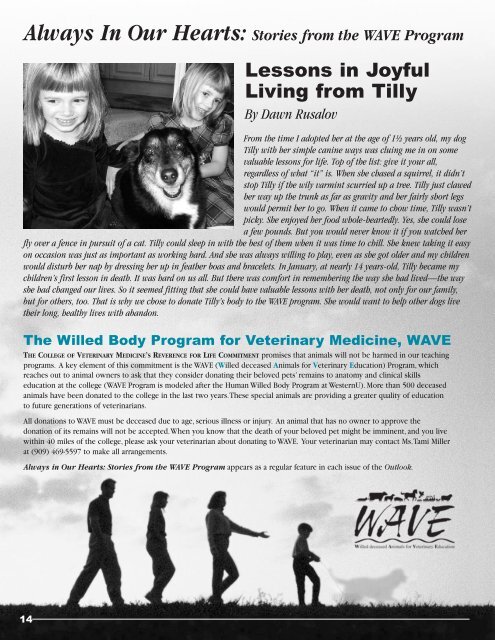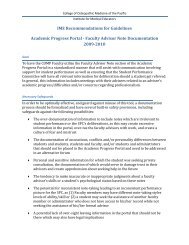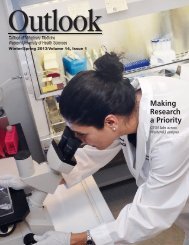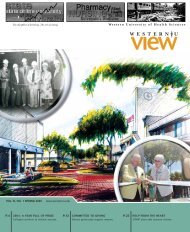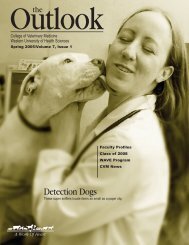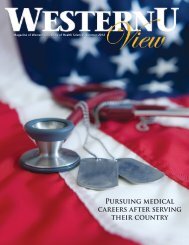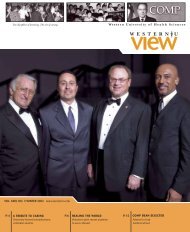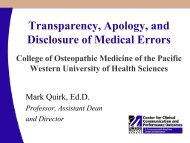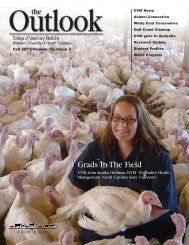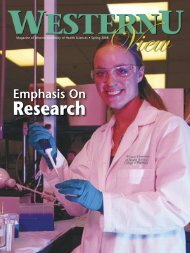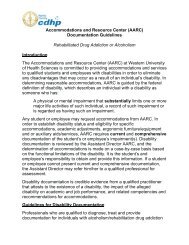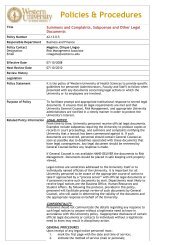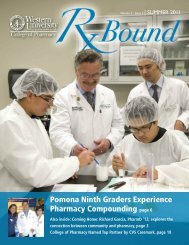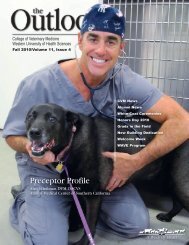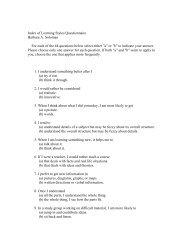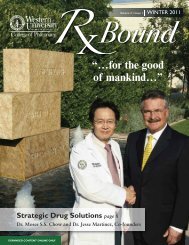College of Veterinary Medicine Western University of Health Sciences
College of Veterinary Medicine Western University of Health Sciences
College of Veterinary Medicine Western University of Health Sciences
You also want an ePaper? Increase the reach of your titles
YUMPU automatically turns print PDFs into web optimized ePapers that Google loves.
Always In Our Hearts: Stories from the WAVE Program<br />
Lessons in Joyful<br />
Living from Tilly<br />
By Dawn Rusalov<br />
From the time I adopted her at the age <strong>of</strong> 1½ years old, my dog<br />
Tilly with her simple canine ways was cluing me in on some<br />
valuable lessons for life. Top <strong>of</strong> the list: give it your all,<br />
regardless <strong>of</strong> what “it” is. When she chased a squirrel, it didn’t<br />
stop Tilly if the wily varmint scurried up a tree. Tilly just clawed<br />
her way up the trunk as far as gravity and her fairly short legs<br />
would permit her to go. When it came to chow time, Tilly wasn’t<br />
picky. She enjoyed her food whole-heartedly. Yes, she could lose<br />
a few pounds. But you would never know it if you watched her<br />
fly over a fence in pursuit <strong>of</strong> a cat. Tilly could sleep in with the best <strong>of</strong> them when it was time to chill. She knew taking it easy<br />
on occasion was just as important as working hard. And she was always willing to play, even as she got older and my children<br />
would disturb her nap by dressing her up in feather boas and bracelets. In January, at nearly 14 years-old, Tilly became my<br />
children’s first lesson in death. It was hard on us all. But there was comfort in remembering the way she had lived—the way<br />
she had changed our lives. So it seemed fitting that she could have valuable lessons with her death, not only for our family,<br />
but for others, too. That is why we chose to donate Tilly’s body to the WAVE program. She would want to help other dogs live<br />
their long, healthy lives with abandon.<br />
The Willed Body Program for <strong>Veterinary</strong> <strong>Medicine</strong>, WAVE<br />
THE COLLEGE OF VETERINARY MEDICINE’S REVERENCE FOR LIFE COMMITMENT promises that animals will not be harmed in our teaching<br />
programs. A key element <strong>of</strong> this commitment is the WAVE (Willed deceased Animals for <strong>Veterinary</strong> Education) Program, which<br />
reaches out to animal owners to ask that they consider donating their beloved pets’ remains to anatomy and clinical skills<br />
education at the college (WAVE Program is modeled after the Human Willed Body Program at <strong>Western</strong>U). More than 500 deceased<br />
animals have been donated to the college in the last two years.These special animals are providing a greater quality <strong>of</strong> education<br />
to future generations <strong>of</strong> veterinarians.<br />
All donations to WAVE must be deceased due to age, serious illness or injury. An animal that has no owner to approve the<br />
donation <strong>of</strong> its remains will not be accepted.When you know that the death <strong>of</strong> your beloved pet might be imminent, and you live<br />
within 40 miles <strong>of</strong> the college, please ask your veterinarian about donating to WAVE. Your veterinarian may contact Ms.Tami Miller<br />
at (909) 469-5597 to make all arrangements.<br />
Always in Our Hearts: Stories from the WAVE Program appears as a regular feature in each issue <strong>of</strong> the Outlook.<br />
14


